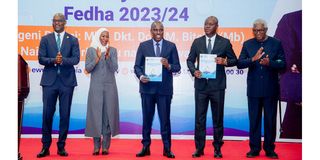Prime
Ewura to conduct study on cost of electricity service delivery

What you need to know:
- The move could lead to the review of the cost structure and electricity tariffs which have remained untouched since 2016, despite significant investments in infrastructure
Dar es Salaam. The Energy and Water Utilities Regulatory Authority (Ewura) plans to conduct a study in the 2025/26 financial year to assess the true cost of electricity service delivery, its director general, Dr James Mwainyekule, has announced.
Speaking on Monday, April 7 during the launch of the 2023/24 Energy Sector Performance Report in Dodoma, Dr Mwainyekule said the move follows the completion of major government-led electricity projects, including the Kinyerezi gas-powered plants and the Julius Nyerere Hydropower Project (JNHPP).
He explained that the cost structure and electricity tariffs have not been reviewed since 2016, despite significant investments in infrastructure.
This, he said, has contributed to a steady improvement in the financial position of the Tanzania Electric Supply Company (Tanesco).
“Tanesco has now posted profits for three consecutive years, a major turnaround from the years of consistent losses,” Dr Mwainyekule said.
He pointed out that in the past, reliance on rented power-generating equipment led to tariff hikes of around 40 percent in 2011 and 39 percent in 2013.
However, tariffs were not revised downward even after the phase-out of the costly generators.
He also highlighted the government’s decision to convert Tanesco’s Sh2.4 trillion debt into equity as a key move that has improved the utility’s financial liquidity.
“With the government having completed major power projects such as Kinyerezi and JNHPP, we now intend to conduct a comprehensive study in the 2025/26 financial year to understand the real cost of service delivery,” he said.
Statistics presented at the event revealed that by 2023/24, the country had increased its installed electricity generation capacity by approximately 26 percent, with the total national generation capacity now at 4,032MW.
Transmission infrastructure grew by nine percent, while four new substations were constructed. Electricity distribution infrastructure also saw a 15 percent increase.
Dr Mwainyekule added that the electricity shortages experienced in 2023 were resolved by February 2025, following the commencement of power generation from JNHPP, which contributed 490MW.
“The increase in power generation has resolved the availability challenges we previously faced,” he said.
Regarding natural gas, he reported that by March this year, there were 15,000 vehicles using compressed natural gas (CNG), with household connections rising by 49 percent. The number of industries using gas grew from 54 to 58.
As he officiated the launch of the report, Deputy Prime Minister Doto Biteko said electricity demand is projected to reach 4,878MW by 2030 and 8,055MW by 2035.
He emphasised that this underlines the need for continued investment in renewable energy sources such as solar and wind, with projects underway in regions including Kishapu (Shinyanga) and Singida.
However, he expressed concern over 31 signed power purchase agreements (PPAs) that have never been operationalised—21 of which are solar-based.
“These projects were expected to deliver 157MW. Tanesco must follow up on why implementation has stalled,” he said.
“At one point I told Tanesco, having multiple MoUs for solar and wind that never progress blocks other serious investors. You cannot have 57 MoUs with no results,” he added.
Dr Biteko urged Ewura to assist in assessing and expediting the review of the dormant agreements.





